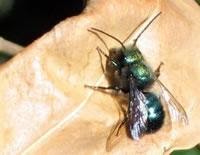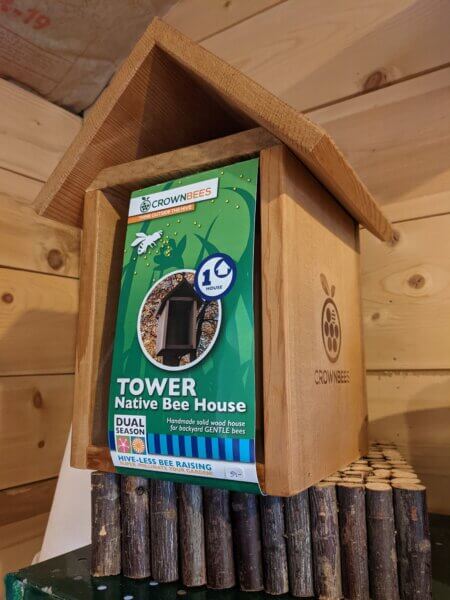
We are excited to announce the arrival of our Blue Orchard Mason Bee (Osmia lignaria) larvae!
Blue Orchard Mason Bee (Osmia lignaria).
Photo Credit: U.S. Forest Service
Mason bees are a variety of unaggressive, solitary bees, which means each female builds and tends to her own nest instead of living in a communal hive. While each matriarch tends to her own nest, you can often find many nests clustered together.
In the wild, solitary bees will use hollow plant stems and old beetle tunnels for nests. While mason bees can find these structures in a backyard garden, you can ensure they have a place of their own by providing a nesting block. A mason bee nesting block allows each bee to have its own nesting tube while being nearby to other bees, like individual apartments in a larger complex.
 Super Pollinators
Super Pollinators
Although honeybees may be given the most credit for pollinating, mason bees (a bee species native to North America) are the true pollinator superstars. Mason bees are known to be 300x more efficient compared to Honey Bees! Unlike some bee species that collect pollen on their legs, mason bees carry pollen on their bellies, allowing for more effective pollen transfer between flowers.
Part of what makes mason bees superior pollinators is they get going early in the season while other pollinators are still waking up from their winter snooze. Once the outdoor temperature low is around 55 degrees Fahrenheit, these early risers make their debut.
As soon as a mason bee emerges in the spring, it gets to work. Different bee species specialize in pollinating different kinds of plants. Mason bees are highly effective at pollinating fruit trees, berries, and legumes. They work none stop and often revisit the same group of plants, resulting in an abundant harvest for you. You might even have enough bounty to share with the birds.
To learn more about a mason bee’s life cycle and to get an inside look at a nesting tube, check out the mini-documentary from Oregon Public Broadcasting.
Call to make an in-store shopping appointment to see what we have for your mason bee needs. Whether you are an expert in need of new larvae or just getting started, our team can get you ready for spring.
